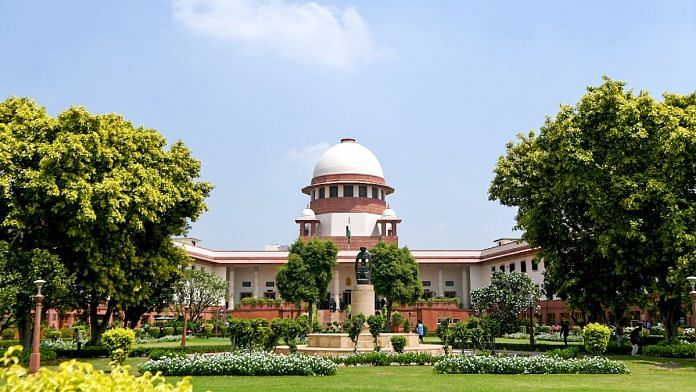New Delhi: The Supreme Court Monday gave no interim relief to Kerala on its plea challenging the limitations placed by the central government on its borrowing capacity.
However, the bench of justices Surya Kant and K.V. Viswanathan acknowledged the important “constitutional” questions raised in the petition on the interpretation of some crucial Articles of the Constitution vis-a-vis Centre-State relations. Hence, it referred the matter to a five-judge constitution bench for a final adjudication.
A pertinent question framed by the bench for the constitution bench’s consideration is whether Article 293 vests a state with an enforceable right to raise borrowing from the Union government and/or other sources. If yes, then to what extent such a right can be regulated by the central government.
“Since Article 293 (dealing with borrowing powers of states) of the Constitution has not been so far the subject to any authoritative interpretation by this court, in our considered opinion, the aforesaid questions squarely fall within the ambit of Article 145(3) (invoked to refer a matter to five-judges bench) of the Constitution,” reasoned the bench while making the reference.
Besides, the court observed that Kerala’s petition points to “various questions of significant importance impacting the federal structure of governance as embedded in our Constitution”.
The case was referred to the court following Kerala’s lawsuit against the Union government, alleging that the central authority’s restrictions on borrowing have pushed the state to the verge of a financial crisis, jeopardising its ability to disburse salaries, pensions, and meet other critical financial obligations.
While challenging the central government’s 2018 order restricting the states’ borrowing capacity, Kerala had insisted on an interim order directing the Centre to release funds to it until its petition is adjudicated on merits.
It contended that, based on its finance accounts audited by the Comptroller and Auditor General of India and the achievement of fiscal deficit targets, Kerala has underutilised the permissible borrowing space in the last three financial years (FY) 2020-21, 2021-22 and 2022-23 to the extent of Rs 24,434 crore.
But the bench disagreed with Kerala’s stand and pointed out that the state itself had admitted to “over-borrowing/over-utilisation of the borrowing limit between the FYs 2017-18 and 2019-20”.
“It is not denied that if, as contended by the Union, such over-borrowings are adjustable in the succeeding years, then the state has already exhausted its borrowing limits for the FY 2023-24,” the court observed.
The bench also rejected the state’s plea for interim relief based on the most commonly invoked three-pronged test.
Under the three-pronged test, the court determines whether there is a prima facie case in favour of the applicant, ascertains the balance of convenience and whether any irreparable injury would be caused to the applicant in case an interim order is not granted to it.
On all three counts, the court said, Kerala had failed to establish a case for a favourable interlocutory order.
Rejecting the plea for interim relief, it said, “Prima facie, we are inclined to accept the argument of the Union that where there is over-utilisation of the borrowing limit in the previous year, to the extent of over-borrowing, deductions are permissible in the succeeding year, even beyond the award period specified in the 14th Finance Commission report.”
It added: “This is, however, a matter which will have to be finally decided in the suit.”
‘Self-created financial hardship’
The bench felt that self-created financial hardship due to a state’s own financial mismanagement cannot be held to be an irreparable injury that would necessitate interim relief against the Centre.
An interim mandatory injunction against the central government, warranting it to take positive action, “might set a bad precedent in law”, the court warned. “It would enable the states to flout fiscal policies and still successfully claim additional borrowings,” it added.
The court said that Kerala “has not been able to demonstrate at this stage that, even after adjusting the over-borrowings of the previous year, there is fiscal space to borrow”.
It found merit in the central government’s submission that, after the inclusion of off-budget borrowing for FY 2022-23 and adjustments for over-borrowing of past years, the state has no unutilised fiscal space and that it has in fact over-utilised its fiscal space.
Hence, the court said, “We are unable to accept the argument of the plaintiff at the interim stage that there is fiscal space of unutilised borrowing of either Rs 10,722 crore, as was orally prayed during the hearing, or Rs 24,434 crore, which was the borrowing claimed in the negotiations with the Union.”
(Edited by Richa Mishra)
Also Read: What’s the ordinance on bureaucrat posting in Delhi & Kejriwal-Centre tussle over ‘services’



